Motorcycling offers a sense of freedom that’s hard to match, but to keep the ride smooth and legal in Nevada, it’s essential to know the state’s motorcycle laws. Whether you’re a seasoned rider or just getting started, understanding these regulations can help you avoid fines, stay safe, and maximize your riding experience.
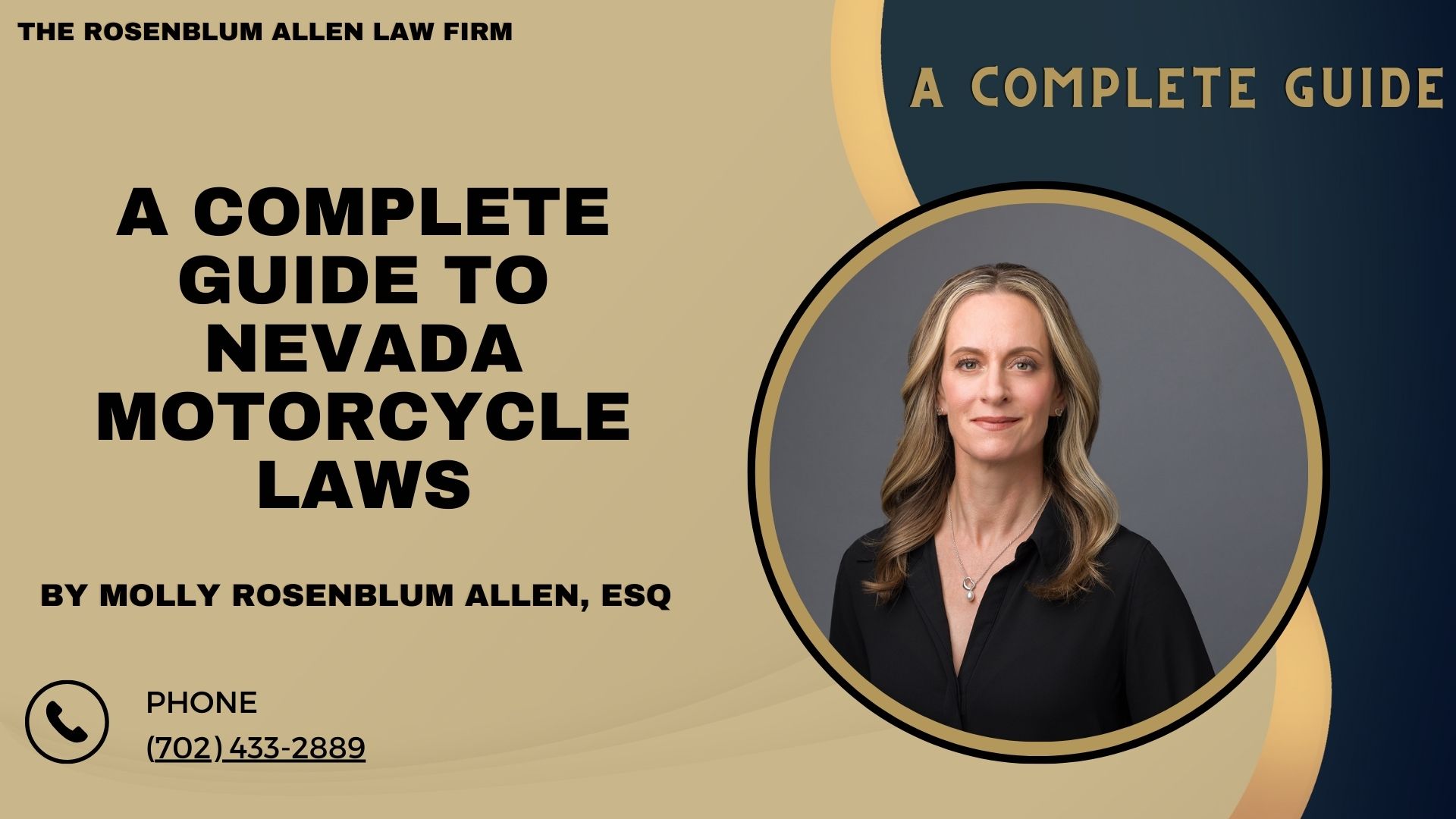
 Who Needs a Motorcycle License in Nevada
Who Needs a Motorcycle License in Nevada
You’ll need the correct type of license to ride a motorcycle in Nevada legally. Here’s a breakdown of the requirements:
Definition of a Motorcycle in Nevada
In Nevada, a motorcycle is defined as any motorized vehicle with a seat or saddle for the rider and not more than three wheels in contact with the ground. This includes traditional motorcycles, motor-driven cycles, and scooters that meet this description.
Age Requirements for Obtaining a Motorcycle License
To ride a motorcycle, you must be at least 16 years old. If you’re under 18, you’ll need to follow specific steps:
- Motorcycle Permit for Minors: Riders aged 16 or 17 must obtain a motorcycle instruction permit first. This allows them to practice riding under certain restrictions, like riding only during daylight hours and not carrying passengers.
- License for Adults: If you’re over 18, you can skip the permit step and apply for a Class M license after passing the necessary tests.
Classes of Licenses Required for Different Types of Motorcycles
Different licenses are depending on the type of vehicle you ride:
- Class M License: This is required for operating motorcycles and motor-driven cycles. If you already have a regular driver’s license, you can add the Class M endorsement by passing the necessary tests.
- Mopeds and Scooters: In Nevada, you don’t need a Class M license for mopeds as long as they don’t exceed 30 mph or 50. However, regular traffic laws still apply.
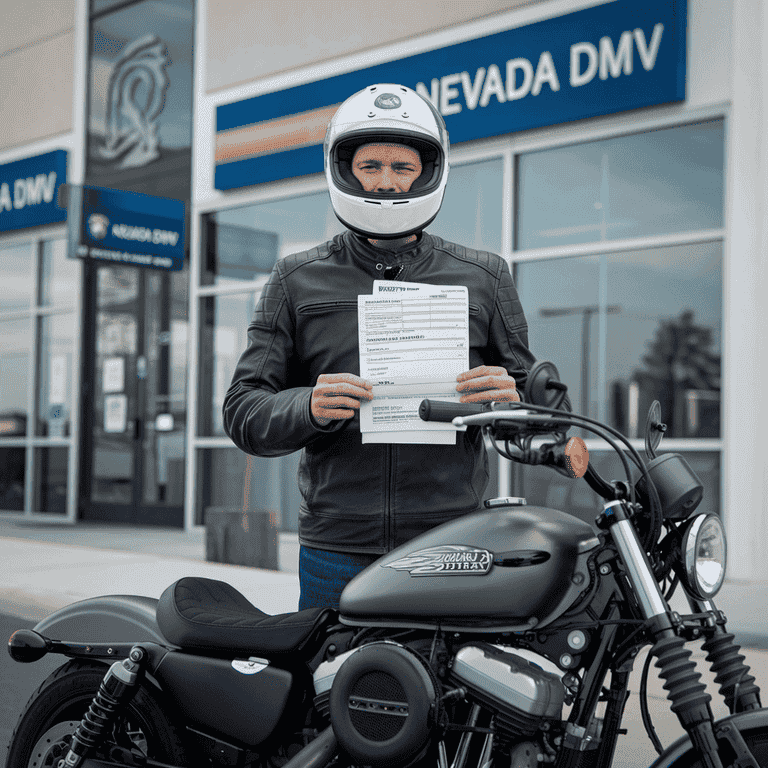
Motorcycle Registration Requirements
Once you have your license, your motorcycle needs to be properly registered. The registration process for motorcycles is similar to that for cars, but there are a few key differences.
Steps to Register a Motorcycle in Nevada
It would help if you visited the Nevada Department of Motor Vehicles (DMV) with the following:
- A completed application for vehicle registration.
- Proof of identity and residency.
- Proof of insurance (meeting the state’s minimum requirements).
- Title of the motorcycle (if applicable).
- Payment of registration fees.
Inspection Requirements for Registration
Motorcycles in Nevada generally don’t require emissions or smog checks like cars do. However, they must meet basic safety requirements, such as functioning lights, brakes, and mirrors.
- Smog Check Exemption: Motorcycles are exempt from Nevada’s smog check requirements, simplifying the registration process.
Registration Renewal Process
Motorcycle registrations need to be renewed annually. You can do this online, by mail, or in person at a DMV office. Be sure to renew on time to avoid late fees or penalties.
Helmet and Safety Gear Laws
Safety is a priority when riding a motorcycle, and Nevada enforces strict helmet and gear regulations to keep riders safe on the road. Knowing what gear is legally required—and recommended—can make all the difference in an accident.
Nevada’s Universal Helmet Law
Nevada has a universal helmet law, which means everyone, regardless of age or experience, must wear a helmet while riding a motorcycle. This applies to both drivers and passengers.
- Helmet Standards: Helmets must meet the standards set by the U.S. Department of Transportation (DOT). Look for a DOT sticker on the back of the helmet to ensure compliance. Wearing a DOT-approved helmet significantly reduces the risk of head injuries in an accident.
Eye Protection Requirements
In Nevada, eye protection is mandatory for motorcyclists unless your bike has a windshield.
- Goggles or Face Shields: If your motorcycle doesn’t have a windshield, you must wear protective eyewear, such as goggles or a full-face helmet with a shield.
- Windshield Exemption: If your bike’s windshield provides adequate protection, you can skip the goggles or face shields.
Clothing Recommendations for Enhanced Safety
While Nevada law doesn’t require specific protective clothing beyond helmets and eye protection, wearing proper gear is essential for safety.
- Gloves: Gloves can protect your hands from debris, wind, and injury in case of a fall.
- Jackets: Leather or armored jackets provide excellent protection against road rash in an accident.
- Padded Gear: Consider gear with built-in padding for your elbows, knees, and shoulders.
- Reflective Gear: At night, wearing reflective clothing or accessories is an excellent idea to improve your visibility to other drivers.
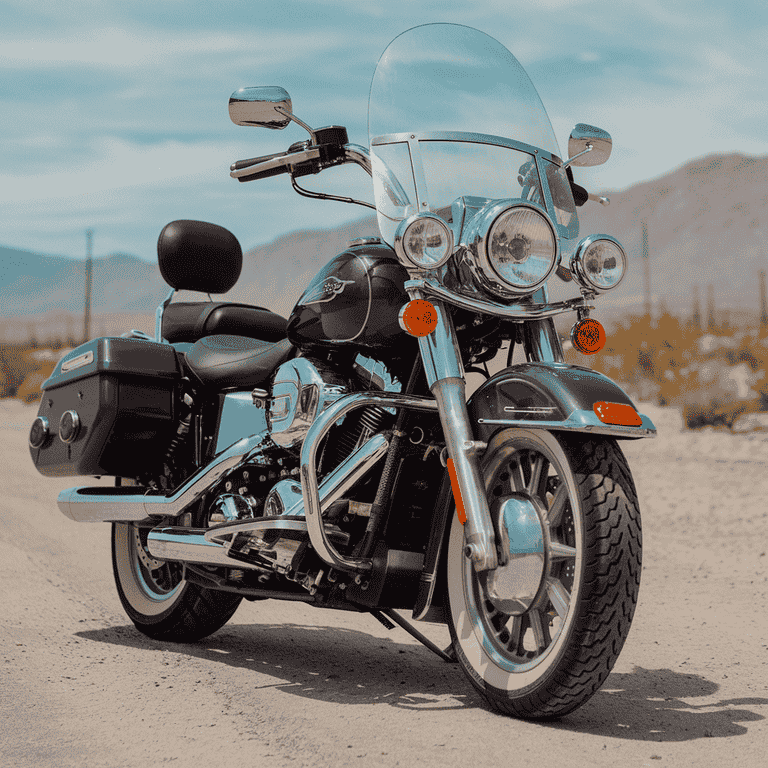
Motorcycle Equipment Requirements
Just as important as wearing the right gear is ensuring your motorcycle meets Nevada’s safety standards. There are specific requirements your bike must follow to be road-legal.
Mandatory Equipment for Motorcycles
Nevada law requires motorcycles to have certain safety features in working order:
- Mirrors: You must have at least one rearview mirror that provides a clear view of the road behind you.
- Lights: Your motorcycle must be equipped with a headlight, taillight, brake light, and turn signals. These lights must be functional and visible from a specified distance.
- Brakes: Both front and rear brakes must be in good working condition.
- Handlebar Height: Handlebars cannot be more than 6 inches above the rider’s shoulders when seated.
- Horn: You need a functional horn to alert other drivers of your presence when necessary.
Requirements for Passengers
Nevada allows you to carry passengers, but your motorcycle must meet certain conditions:
- Passenger Seat: You need a dedicated passenger seat for a second rider.
- Footrests: Passengers must have footrests or pegs to support their feet.
Age Restrictions for Passengers
While motorcycle passengers have no specific age limit, they must be able to sit safely on the passenger seat and reach the footrests. It’s essential to ensure young passengers can sit securely without risk.
Lane Splitting and Lane Sharing in Nevada
Lane splitting—when a motorcyclist rides between lanes of traffic—can be a gray area in many states. However, Nevada is clear about its rules regarding this practice.
Nevada’s Stance on Lane Splitting
In Nevada, lane splitting is illegal. This means that motorcycles cannot move between slow or stopped traffic lanes. Lane splitting might seem like a time-saver, but it can be dangerous and is not permitted under Nevada law.
- Penalties for Lane Splitting: If you’re caught lane splitting, you could face fines or even points on your license. It’s safer—and legal—to stay within your designated lane, even in traffic.
Legalities of Lane Sharing with Other Vehicles
While lane splitting is illegal, lane sharing—when two motorcycles ride side-by-side in the same lane—is allowed in Nevada under certain conditions.
- Riding Two Motorcycles Side-by-Side: Two motorcycles are permitted to share a lane as long as they ride abreast of each other, and both riders are aware of and agree to this formation. However, riding cautiously and being mindful of different vehicles is crucial.
- Sharing a Lane with a Car: You cannot share a lane with a car or truck. Cars need the entire width of their lane, and so do you.
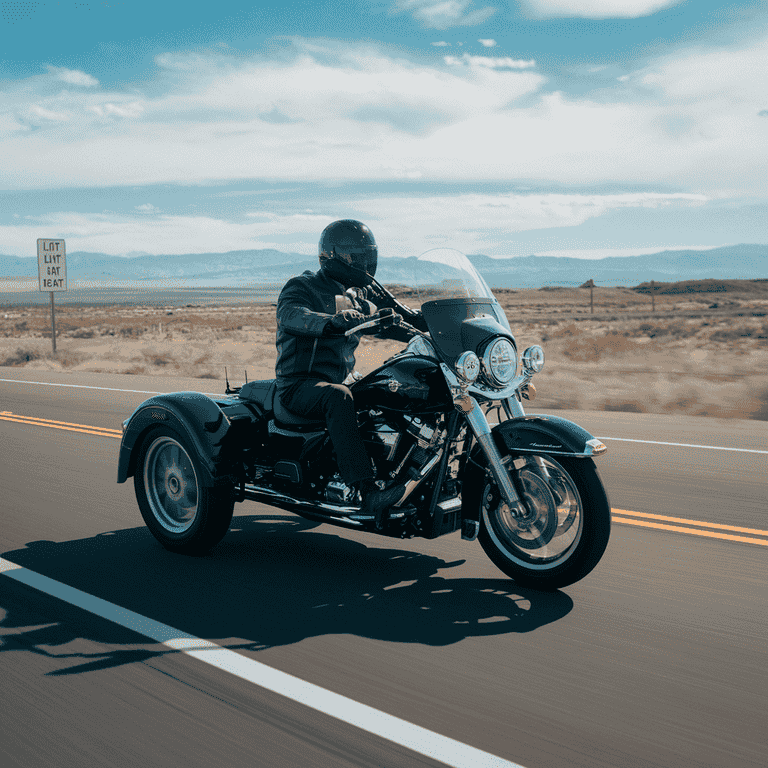
Motorcycle Speed Limits and Traffic Laws
Nevada motorcycle riders must follow the same speed limits and traffic laws as cars and other motor vehicles. However, understanding the specific rules for motorcyclists can help you stay safe and avoid tickets.
Speed Limits for Motorcycles in Nevada
Motorcycle speed limits generally follow the same guidelines as other vehicles. But in certain areas, it’s important to pay extra attention.
- Urban Areas: The speed limit is typically 25 to 35 mph in residential or business districts.
- Highways: The speed limit can range from 65 to 80 mph on highways and rural roads.
- School Zones: School zones often have reduced speed limits of 15 to 25 mph during designated hours.
Always check posted signs, as speed limits vary based on road conditions and local regulations.
Special Restrictions in Certain Zones
There are special zones in Nevada where motorcyclists must be extra cautious:
- Construction Zones: Reduced speed limits are often enforced in construction zones, and fines can be doubled.
- Curves and Winding Roads: Certain roads with sharp curves may have reduced speed limits for safety. Slowing down when navigating curves is essential, especially if visibility is limited.
Traffic Laws and Right-of-Way Rules
As a motorcyclist, you must follow all traffic laws, including stop signs, traffic lights, and right-of-way rules. Here are a few key guidelines:
- Intersections: Always come to a complete stop at red lights and stop signs. Watch for cars that may not see you, especially when turning left.
- Merging: When merging onto a highway or into traffic, signal early and check your blind spots carefully. Remember that motorcycles are smaller and harder to see.
- Overtaking Other Vehicles: Passing slower-moving vehicles is legal, but you must do so within the speed limit and only when safe.
Staying visible and predictable is critical to avoiding accidents, especially at intersections where many motorcycle crashes happen.
DUI Laws for Motorcycle Riders
Nevada takes driving under the influence (DUI) thoughtfully, and this includes motorcycle riders. Just like cars, operating a motorcycle while impaired is illegal and comes with severe consequences.
Nevada’s Blood Alcohol Concentration (BAC) Limits for Motorcyclists
The BAC limit for motorcyclists is the same as for other drivers:
- 0.08%: This is the standard legal limit for drivers over 21.
- 0.04%: This is the lower BAC limit if you’re driving a commercial vehicle.
- 0.02%: For drivers under 21, Nevada enforces a “zero-tolerance” policy, meaning even a small amount of alcohol could result in a DUI charge.
Penalties for First, Second, and Third Offenses
The penalties for riding a motorcycle under the influence can be harsh, and they increase with each offense:
- First Offense:
- Up to 6 months in jail or community service.
- Fines ranging from $400 to $1,000.
- License suspension for 90 days.
- Second Offense:
- Mandatory jail time of 10 days to 6 months.
- Fines ranging from $750 to $1,000.
- License suspension for one year.
- Third Offense:
- 1 to 6 years in state prison.
- Fines up to $5,000.
- License suspension for three years.
Additional Penalties for Driving Under the Influence While on a Motorcycle
Beyond the basic penalties, there are additional consequences for motorcyclists convicted of a DUI:
- License Suspension: If you’re convicted, your motorcycle license will be suspended, and you may face restrictions on reapplying.
- Motorcycle Impoundment: Your motorcycle could be impounded, leading to costly retrieving fees.
- Fines and Possible Jail Time: Depending on your BAC and whether it’s a repeat offense, you could face hefty fines and even time behind bars.
Driving a motorcycle requires full concentration and quick reflexes, so riding under the influence is especially dangerous. It’s always best to ride sober or arrange for alternate transportation.
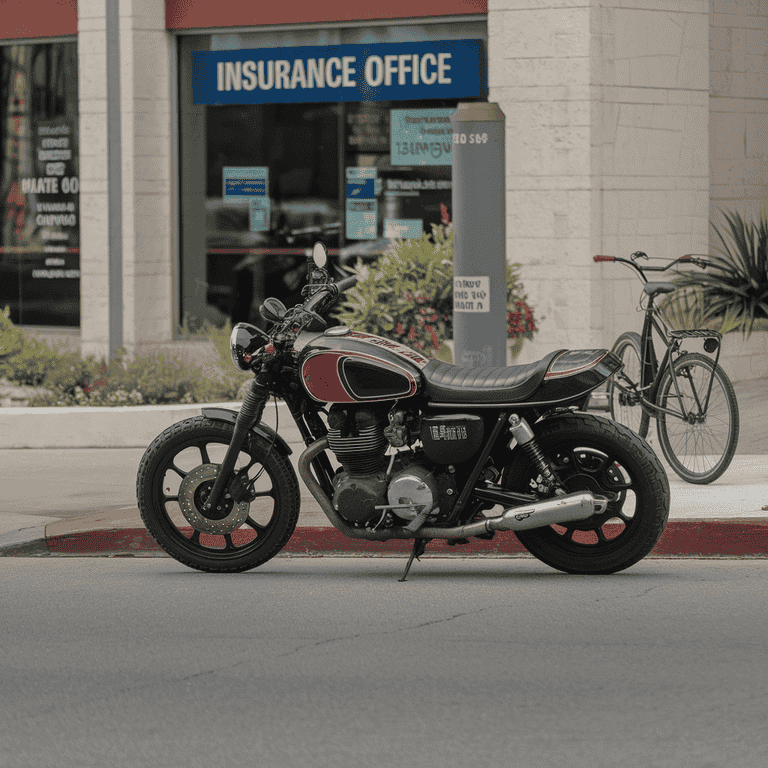
Motorcycle Insurance Requirements in Nevada
In Nevada, all motorcycles must be insured to ride on public roads legally. This insurance helps cover the cost of accidents and protects both you and other drivers.
Additional Coverage Options
Many motorcyclists opt for additional insurance to protect themselves in case of an accident:
- Comprehensive Coverage: This covers damages to your motorcycle from non-accident events like theft, fire, or vandalism.
- Collision Coverage: Covers damages to your motorcycle in case of an accident, regardless of fault.
- Uninsured/Underinsured Motorist Coverage: Protects you if you’re hit by a driver who doesn’t have enough insurance.
Consequences of Not Having Insurance
If you’re caught riding without insurance, the penalties can be severe:
- Fines: You may be fined up to $1,000 for failing to carry insurance.
- Suspension of Registration: Your motorcycle registration may be suspended until you can provide proof of insurance.
- SR-22 Requirement: You may be required to file an SR-22 form, which proves you have had insurance for several years.
It’s essential to keep your insurance up to date and carry proof with you while riding. In the event of an accident, having the right coverage can save you from financial trouble.
Rules for Group Motorcycle Rides
Group rides are a popular and fun way for motorcyclists to enjoy the road together, but important rules must be followed to ensure everyone’s safety. Group riding requires coordination, communication, and a strong understanding of Nevada’s motorcycle laws.
Legalities of Riding in a Group
Riding in a group doesn’t exempt you from Nevada’s motorcycle laws. Each rider must follow traffic laws, speed limits, and safety regulations. However, there are specific guidelines that apply when riding with multiple motorcycles.
- Staggered Formation Rules: The safest way to ride in a group is in a staggered formation. This means the lead rider stays on the left side of the lane, while the second rider positions themselves slightly behind on the right. This allows enough space for everyone to react to obstacles or changes in traffic. It also helps maximize visibility for other vehicles on the road.
- Passing in a Group: When passing another vehicle, each rider should pass individually, rather than as a group. Ensure the road is clear and there’s enough space for each rider to return to the lane safely.
- Intersections: The group should stop or proceed as individual riders rather than a block when approaching an intersection. This prevents confusion for other drivers and reduces the risk of accidents.
Leader Responsibilities During Group Rides
Every group ride needs a leader, who plays a vital role in keeping the group safe and organized. The leader should understand the route well, communicate changes to the group, and keep the pace within legal speed limits.
- Communicate with Hand Signals: The leader uses hand signals to communicate important information, such as turns, lane changes, and hazards. Each rider in the group should repeat the signals to ensure everyone is aware of the upcoming changes.
- Set a Manageable Pace: The leader should set a comfortable pace for all riders in the group, considering their skill levels and the traffic conditions. It’s important not to push slower riders to go faster than they’re comfortable.
Motorcycle Accidents and Liability in Nevada
Accidents happen, even to the most careful riders. Knowing how liability works in Nevada can help you navigate the aftermath of a crash, whether you’re at fault or not.
Nevada’s Fault-Based System for Motorcycle Accidents
Nevada is a fault-based state, meaning the driver responsible for the accident is liable for any damages or injuries. After an accident, insurance companies and law enforcement will determine who was at fault.
- How Liability Is Determined: Liability is usually determined based on evidence from the scene, witness statements, and police reports. If you’re found to be even partially at fault, Nevada’s comparative negligence rule may reduce the compensation you can receive by the percentage of your fault.
For example, if you’re 20% at fault in an accident and your damages amount to $10,000, you can only recover $8,000.
Steps to Take After a Motorcycle Accident
In the event of a motorcycle accident, there are a few important steps to follow to protect your rights and make sure you’re adequately covered by insurance:
- Check for Injuries: First, check yourself and others for injuries. Call 911 if there are any serious injuries.
- Report the Accident: In Nevada, you must report any accident that results in injuries, death, or significant property damage to the police.
- Exchange Information: Get the contact and insurance details of the other driver involved in the accident, and provide your information.
- Document the Scene: Take pictures of the accident scene, your motorcycle, and any damages. These can serve as evidence for a dispute about who’s at fault.
- Contact Your Insurance Company: Notify your insurance company immediately and provide them with the accident details.
Filing an Insurance Claim
After the accident, you must file a claim with your insurance company or the at-fault driver’s insurance. Depending on your coverage, your insurance might cover some of the damages, even if the other driver was at fault.
- Liability Coverage: If you were at fault, your liability insurance will cover the damages to the other driver’s vehicle and medical bills up to the limits of your policy.
- Collision and Comprehensive Coverage: If you have these types of coverage, they will help pay for the repairs to your motorcycle, regardless of who was at fault.
- Uninsured/Underinsured Motorist Coverage: If the other driver doesn’t have enough insurance, this coverage can help pay for your medical bills and damages.
Nevada’s Statute of Limitations for Motorcycle Accident Claims
If you plan to file a lawsuit for injuries or damages from a motorcycle accident, Nevada law gives you a limited time to do so. The statute of limitations is two years from the date of the accident. After this period, you may lose the right to pursue compensation through the courts.


Motorcycle Training and Education Programs
Motorcycle riding requires skill and experience, and Nevada offers a range of training and education programs to help riders improve their abilities and ride more safely.
Available Motorcycle Safety Courses in Nevada
In Nevada, motorcycle safety courses are not only beneficial for new riders but also for experienced ones looking to sharpen their skills. These courses are offered through organizations like the Motorcycle Safety Foundation (MSF) and various local schools.
- Basic Rider Courses (BRC): These are designed for beginners and cover essential skills such as balance, braking, and turning. The course includes both classroom instruction and practical riding experience.
- Advanced Training: For more experienced riders, advanced courses focus on handling complex traffic situations, emergency maneuvers, and improving control at higher speeds.
Benefits of Completing a Motorcycle Safety Course
Completing a motorcycle safety course in Nevada offers several advantages:
- Waiver of Skills Test for Licensing: If you complete a certified Basic Rider Course, the DMV may waive the motorcycle skills test when you apply for a Class M license.
- Potential Insurance Discounts: Many insurance companies offer discounts to riders who have completed an approved motorcycle safety course. It’s a great way to reduce your premiums while becoming a safer rider.

Breaking It All Down
Navigating Nevada’s motorcycle laws can feel overwhelming, but it becomes much more manageable once you break it down. Whether you’re hitting the highways or exploring the rugged off-road trails, understanding and following these regulations can keep you safe and on the right side of the law. From helmet rules and lane-sharing laws to off-road registration requirements, staying informed is the best way to enjoy the freedom of motorcycling in Nevada.
Remember, safety and compliance go hand in hand. Gear up, follow the rules, and ride with confidence, knowing you’re fully prepared for whatever Nevada’s roads or trails throw your way.

Frequently Asked Questions
Do I need a helmet if I only ride a short distance?
Yes, Nevada’s universal helmet law requires all motorcycle riders and passengers to wear a DOT-approved helmet at all times, regardless of the distance or type of road they’re riding on.
Can I use my motorcycle’s high beams during the day?
Yes, using your high beams daily is legal and often encouraged for motorcyclists. It increases visibility, making it easier for other drivers to see you, especially in bright daylight.
Is there a special license for riding a trike (three-wheeled motorcycle) in Nevada?
You don’t need a separate license to ride a three-wheeled motorcycle or trike. The same Class M motorcycle endorsement applies, and you must follow all motorcycle laws.
Are electric motorcycles subject to the same rules as gas-powered motorcycles in Nevada?
Electric motorcycles are subject to the same registration, licensing, and insurance requirements as gas-powered motorcycles. However, electric bikes with lower speeds (e.g., mopeds) may have different licensing needs.
Can I carry a child as a passenger on my motorcycle in Nevada?
Yes, but the child must be able to sit on the passenger seat and reach the footrests safely. While there is no specific age requirement, safety should be your primary consideration when carrying children.
Are motorcycles required to stop at weigh stations in Nevada?
No, motorcycles are not required to stop at weigh stations. These stops are typically only for commercial vehicles over a specific weight limit.
Do I need to signal when changing lanes on a motorcycle?
Like any other vehicle, motorcyclists in Nevada must signal when changing lanes or making turns. Using hand signals or your bike’s signal lights is essential for alerting other drivers to your intentions.
Is using a Bluetooth headset or communication system legal while riding in Nevada?
It is legal to use Bluetooth headsets or helmet communication systems while riding in Nevada. These can be helpful for navigation or communication, but it’s essential to remain focused on the road.
Can I modify my motorcycle’s exhaust system to make it sound louder in Nevada?
While you can modify your motorcycle’s exhaust system, it must comply with Nevada’s noise limits. You may face fines if the exhaust exceeds these limits or lacks the proper spark arrester (for off-road bikes).
What should I do if I hit an animal while riding my motorcycle in Nevada?
If you hit an animal, it’s crucial to safely pull over, assess the situation, and contact local authorities or animal control if needed. You must report accidents involving large animals (like deer) if they cause damage or injury.
Are there any restrictions on the type of tires I can use on my motorcycle in Nevada?
Yes, your tires must be road-safe and meet the manufacturer’s specifications for your bike. If you ride off-road, ensure your tires suit off-road terrain. Street-legal motorcycles must have tires with sufficient tread to ensure safe braking and handling.
Can I park my motorcycle on sidewalks in Nevada?
Parking motorcycles on sidewalks is generally illegal in Nevada unless signage specifically allows it. Motorcycles must be parked in designated spaces just like cars.
Is it required to carry a motorcycle insurance card while riding?
Yes, you must carry proof of insurance with you while riding. This could be a physical or digital card accessible on your phone. If you’re stopped by law enforcement or involved in an accident, you must provide proof of insurance.
Can I ride a motorcycle during the winter months in Nevada?
Yes, you can ride year-round in Nevada, but you must be cautious of winter road conditions. Snow, ice, and sand can make riding hazardous, particularly in northern parts of the state or higher elevations.
Are reflective decals or tape required on motorcycles in Nevada?
Although reflective decals or tape are not required by law, they are strongly recommended, especially for riding at night. Reflective gear and markings can significantly improve your visibility to other drivers.
Can a motorcycle be used in Nevada’s carpool (HOV) lanes?
Yes, motorcycles can use High-Occupancy Vehicle (HOV) lanes in Nevada, even if you ride solo. This can help you avoid congestion during peak traffic hours.

Glossary
Introductory Rider Course (BRC): A safety course for new or inexperienced riders that covers essential skills like balance, braking, and maneuvering. Completing this course can waive the motorcycle skills test for licensing.
Blood Alcohol Concentration (BAC): The measurement of alcohol in a person’s bloodstream. In Nevada, the legal BAC limit for motorcycle riders is 0.08%, with stricter limits for commercial drivers and those under 21.
Class M License: The specific driver’s license endorsement required to operate motorcycles in Nevada. To obtain this endorsement, riders must pass a written or skills test or complete a certified rider safety course.
Comparative Negligence: A legal principle used in Nevada accident cases where each party’s level of fault is determined. The compensation you receive can be reduced based on your percentage of responsibility for the accident.
DOT-Approved Helmet: A helmet that meets the U.S. Department of Transportation (DOT) safety standards. Nevada requires all motorcycle riders and passengers to wear DOT-approved helmets.
Exhaust System: The motorcycle part responsible for channeling exhaust gases away from the engine. Nevada requires motorcycles to have correctly functioning exhaust systems that meet noise and emission regulations.
High-Occupancy Vehicle (HOV) Lane: A designated traffic lane for vehicles carrying two or more passengers. Motorcycles are legally allowed to use these lanes in Nevada, even with only one rider.
Liability Insurance: A type of insurance required by law in Nevada, which covers injuries and property damage to others if you are at fault in a motorcycle accident. It does not cover your injuries or damages.
Lane Splitting: The practice of riding a motorcycle between slow-moving or stopped traffic lanes. Lane splitting is illegal in Nevada, which can result in fines.
Lane Sharing: The practice of two motorcycles riding side-by-side in the same lane. Lane sharing is legal in Nevada, but only between two motorcycles, not between a bike and a car.
Motorcycle Permit: A temporary license that allows new or unlicensed riders to practice on public roads under specific conditions. In Nevada, a motorcycle permit is required for riders under 18 before applying for a full Class M license.
Off-Highway Vehicle (OHV): Motorized vehicles like dirt bikes and all-terrain vehicles (ATVs) designed for off-road use. These vehicles must be registered with the Nevada DMV if manufactured after 1976.
Reflective Gear: Clothing or accessories with reflective materials increase a rider’s visibility, especially at night. While not required by law, reflective gear is strongly recommended for motorcycle riders.
Registration Decal: A sticker issued by the Nevada DMV as proof that a motorcycle or off-road vehicle is registered correctly. The decal must be displayed on the car as required by law.
Spark Arrester: A device fitted to a motorcycle’s exhaust system that prevents sparks from escaping, reducing the risk of starting wildfires. This is a requirement for off-road motorcycles in Nevada.
Statute of Limitations: The legal time limit for filing a lawsuit after an accident or injury. In Nevada, the statute of limitations for motorcycle accident claims is two years from the accident date.
Staggered Formation: A riding formation where motorcyclists ride in a zigzag pattern within the same lane, allowing for safer spacing and improved visibility. This is the recommended formation for group rides in Nevada.
Turn Signals: Motorcycle lights indicate turns or lane changes to other drivers. Nevada law requires motorcycles to have functioning turn signals.
Uninsured/Underinsured Motorist Coverage: An optional type of motorcycle insurance that covers your injuries and damages if you’re in an accident with a driver with little or no insurance.
Universal Helmet Law: A law that requires all motorcycle riders and passengers to wear helmets, regardless of age or experience. Nevada enforces a universal helmet law.
Zero-Tolerance Policy: Nevada’s strict DUI law for drivers under 21, where a blood alcohol concentration (BAC) of just 0.02% or higher can result in a DUI charge.

Additional Resources for You
Our lead attorney, Molly Rosenblum Allen, Esq., has created several resources for those in need of legal assistance. Here’s a straightforward guide to what we offer:
- Hurt in an accident? Visit our Las Vegas Personal Injury Attorney page.
- Involved in a car crash? Check out Las Vegas Car Accident Attorney.
- For motorcycle accident concerns, see Motorcycle Accident Lawyer Las Vegas.
- If you’ve lost a loved one due to negligence, our Wrongful Death Lawyer Las Vegas can help.
- For truck accident issues, visit Truck Accident Attorney Las Vegas.
- Dealing with a drunk driving incident? Our Las Vegas Drunk Driving Accident Attorney is here.
- Slipped and fell? Go to Las Vegas Slip and Fall Attorney.
Molly Rosenblum Allen, Esq., offers these resources to ensure you have the right legal support when you need it. Each link leads to detailed information on how we can assist you.

Outside Resources for You
Here are seven straightforward resources you might find helpful:
American Bar Association (ABA): This is your go-to for legal guides and finding legal help. Visit ABA
National Highway Traffic Safety Administration (NHTSA): Find safety tips and data on road safety, focusing on motorcycles. Visit NHTSA
Insurance Information Institute (III): Learn about different insurance options, including motorcycle insurance. Visit III
National Association of Insurance Commissioners (NAIC): Understand insurance laws and find your state’s insurance requirements. Visit NAIC
American Motorcyclist Association (AMA): Offers information on motorcycle rights and legal advocacy. Visit AMA
FindLaw: A comprehensive site for legal information, including personal injury and traffic laws. Visit FindLaw
United States Department of Transportation (USDOT): Get info on transportation and safety laws affecting riders. Visit USDOT
These resources are great for exploring legal advice, insurance details, and safety guidelines related to motorcycle riding.

A Special Message from Our Lead Attorney, Molly Rosenblum Allen, Esq

Thanks for reading our guides. I’m Molly Rosenblum Allen, Esq. I hope you found the information helpful. We’re here for you if you have questions or need more help. You can schedule a free consultation by calling us at (702) 433-2889. Let’s talk about how we can assist you further.
Best,
Molly Rosenblum Allen, Esq.



